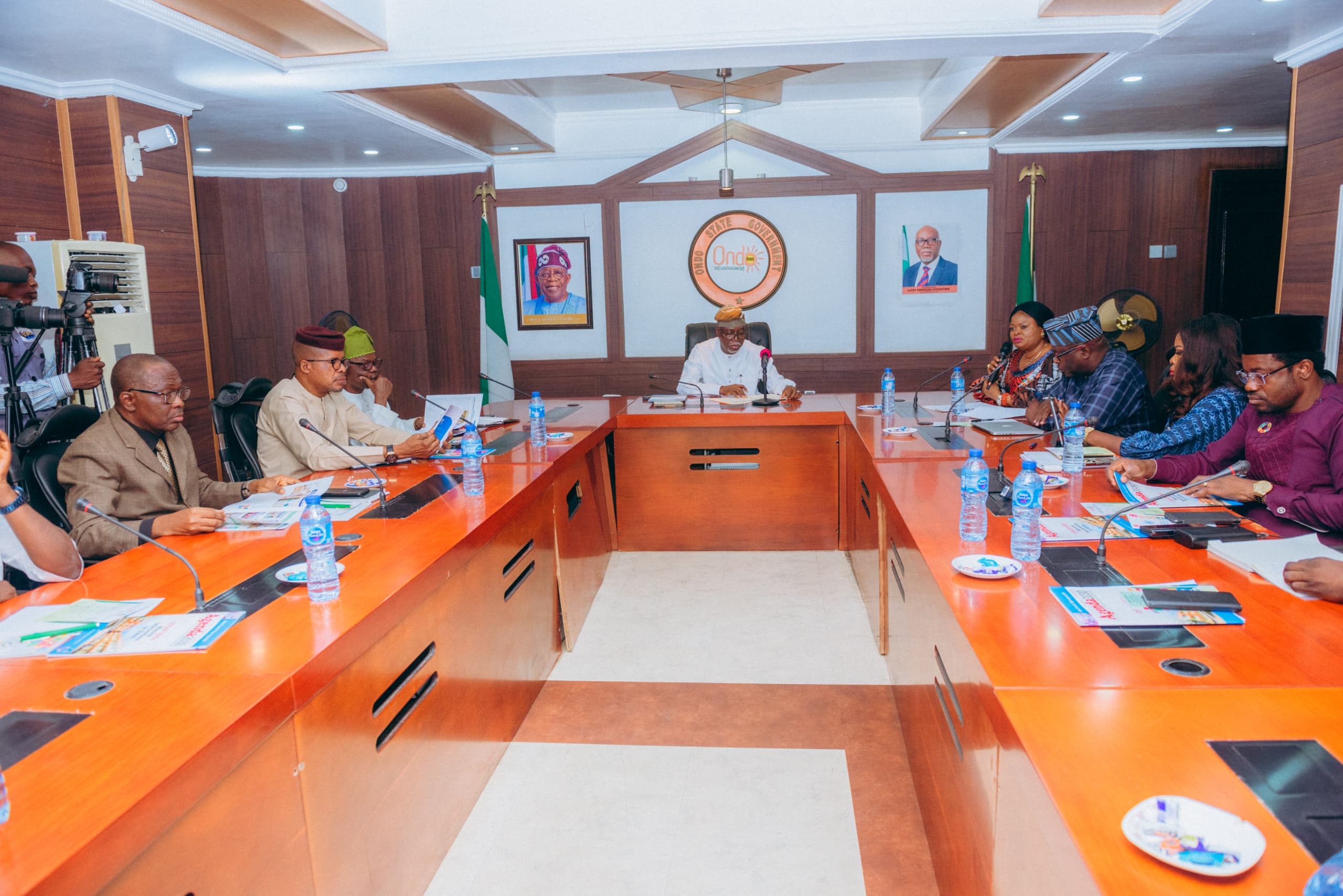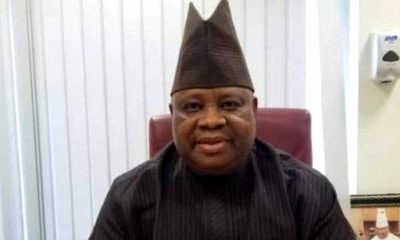NEWS
FG Task States, LGs On Accelerating SDGs

A call has gone to the various federating units of Nigeria, the states, the Federal Capital Territory Administration (FCTA) and local governments to take decisive steps for the achievement of the Sustainable Development Goals (SDGs).
The Senior Special Assistant to the President on Sustainable Development Goals, (SSAP-SDGs) Princess Adejoke Orelope-Adefulire, made this call at the ongoing Advocacy and Sensitisation campaign in Kano and Ondo States.
According to the Presidential Aide, the global community seeks to accelerate the implementation of the Global Agenda in the Decade of Action for the Goals.
A statement issued by Desmond Utomwen, the Special Assistant on Media and Publicity to the SSAP-SDGs, noted that with the global community lagging behind in the efforts to attain the SDGs and with Nigeria facing various challenges, the need for all stakeholders, particularly State and Local Governments, to accelerate progress has become more imperative.
According to Orelope-Adefulire, despite the commitment and efforts as a country, Nigeria is faced with issues and challenges in the desire to achieve the SDGs. She noted that, partly due to the now Triple C Crisis – COVID, Climate Change, and Conflicts, the implementation is off-track globally, and only 15 percent of the SDGs targets are on track as of 2023.
“In Nigeria, the Multidimensional Poverty Index Report (2022) shows that about 63 percent or 133 million Nigerians are multi-dimensionally poor. The report shows that poverty levels vary significantly across the states and the geopolitical zones. Specifically, multidimensional poverty is higher in rural areas, where 72 percent of people are poor, compared to 42 percent in urban areas. Overall, the report revealed that 65 percent of poor people live in the North, while 35 percent live in the South.
“Relatedly, the National Bureau of Statistics’ Multiple Indicator Cluster Survey Report (2022) shows that the Under-5 mortality rate, which represents SDG 3.2.1, is 102 per 1,000 live births – with Sokoto, Kebbi, Katsina, and Jigawa recording the highest, and FCT, Benue, Kwara, and Ebonyi States recording the lowest.
“On SDG 4, quality education among children and adolescents aged 7-14 years, only about 27 percent have foundational reading skills, and 25 percent have foundational numeracy skills. This translates to a low out-of-school rate found in Ekiti State at (2%) and Imo (1%), while the highest rates are found in Kebbi (65%) and Zamfara and Bauchi States both at 61%”.
The SSAP-SDGs noted that the Federal Government has demonstrated strong commitment towards the implementation of the SDGs in Nigeria and requires the sub-national governments to match these efforts, particularly as the tier of government closest to the people.
She noted that institutional frameworks have been established at the national and sub-national levels to guarantee effective implementation of the SDGs. The SDGs require a whole-of-society approach and clearly cannot be achieved with stand-alone policies and projects. They must be carefully integrated into national and sub-national policies and development plans.
“As we approach the 2030 deadline, we must recommit to accelerating the implementation of the SDGs, especially at the state and Local Governments level. As part of the transformative actions needed to deliver on the SDGs, we need the expertise and resources of the public and private sectors, the UN Development System, development partners and the donor community, academia, civil society, and concerned citizens in support of the SDGs.” Orelope-Adefulire stated.
In his remarks, the Governor of Ondo State, Hon. Lucky Orimisan Aiyedatiwa, maintained that the Sustainable Development Goals are a blueprint for a better future for all, addressing global challenges like poverty, inequality, climate change, and environmental degradation.
Ondo State is uniquely naturally endowed and positioned to achieve these goals of the SDGs. The State is blessed with abundant natural resources, a vibrant population, and a rich cultural heritage. He expressed his commitment and optimism that through continued partnerships with the Federal Government and other stakeholders, Nigeria can deliver on the SDGs.
“I am confident that through seamless collaboration and innovation, we can make significant progress towards achieving the SDGs at the sub-national level. On our part, the Ondo State Government is committed to playing its part in achieving the SDGs. We recognize the importance of these goals and are actively working to integrate them into our policies. Together, let us build a future that is sustainable, equitable, and prosperous for all,” the Governor stated.
In the same vein, the Governor of Kano State, Abba Kabir Yusuf, who was represented by his Chief of Staff, Hon. Shehu Shegagi, maintained that the state is committed to delivering on the Targets of the SDGs, while leaving no one behind.
NEWS
Moghalu Prescribes Good Governance As Panacea To Ethnic Agitation

The President of the African School of Governance, Kingsley Chiedu Moghalu has admonished state actors against resorting to brutal force in the bid to muscle out separatist agitators.
In the aftermath of Mazi Simon Ekpa, the Finland based Biafran nationalist agitator being caught in legal web and the Nigerian government moving swiftly to seek his repatriation, the former deputy governor of the Central Bank of Nigeria (CBN) has cautioned that ‘We either fix our problems, or our problems will eventually “fix” us. No alternative to a renegotiated union.’
ALSO READ: Finnish Police Arrest Simon Ekpa Over Terror-Related Allegations
The political economist, while expressing his hope in Nigeria, made it clear that “hope is not a strategy”.
He bared his mind in a series of posts on his verified handle on micro-blogging site, X on Friday.
Moghalu wrote, “Despite sustained contemporary difficulties, I am hopeful about Nigeria. But hope is not a strategy. We need to improve state capacity for effective governance.
“We either fix our problems, or our problems will eventually “fix” us. No alternative to a renegotiated union.
“We must learn to be honest with ourselves and address the root causes of our problems. Why ignore them, when the problem is actually quite solvable? The problem with continuing with this approach is that when the danger crystallizes, those who thought they were benefiting from
NEWS
N1.7trn Loan: Atiku Blames NASS For Worsening Nigeria’s Debt Burden
Former Vice President, Atiku Abubakar has criticized the federal government’s plan to secure an additional N1.7 trillion loan through Eurobonds to cover a shortfall in the 2024 budget, describing the borrowing as unsustainable and harmful to Nigeria’s economy.
In a statement shared on Thursday via his X (formerly Twitter) handle, Atiku accused the Bola Tinubu-led administration of burdening Nigerians with debt while failing to provide clear answers about the country’s fiscal challenges.
READ ALSO: CSR: Dangote Cement Fuels Education With Support Projects At Lagos Schools
He also faulted the National Assembly for enabling what he called a “voracious appetite” for loans.
The former Peoples Democratic Party (PDP) presidential candidate expressed alarm over a recent World Bank report ranking Nigeria as the third most indebted country to the International Development Association (IDA), calling the development troubling.
“The recent report released by the World Bank, showing Nigeria as the third most indebted country to the International Development Association (IDA), is very concerning,” Atiku stated.
He raised further concerns about the government’s decision to benchmark the proposed loan at an exchange rate of 1 USD to N800, despite the Central Bank of Nigeria’s official rate being over N1,600.
“What makes this particular loan proposal even more concerning is that it is benchmarked at the exchange rate of 1 USD to N800, whereas the current exchange rate from the Central Bank of Nigeria stands at over N1,600 to 1 USD,” he said.
Atiku questioned the need for additional borrowing, given the government’s earlier claims of record-high revenue collection.
“In July this year, Tinubu boasted that the FIRS and Customs under his watch had collected all-time high revenues to finance the budget. Why are they still borrowing?” he said
He accused the government of a lack of transparency, describing the borrowing spree as detrimental to Nigerians already struggling under economic hardship.
“There is something that they are not telling Nigerians, even as they are being crushed by a combination of their failed trial-and-error policies and loan rackets.”
Atiku also referenced a report by BudgIT, a budget monitoring group, which criticized the 2024 budget for its inefficiencies.
He alleged that corruption, rather than infrastructure or development needs, was driving the government’s borrowing decisions.
“These loans are powered by corruption and not for infrastructure and development needs. This voracious appetite for humongous loans is deeply concerning,” he said.
Reflecting on Nigeria’s financial history, Atiku lamented the return to significant foreign indebtedness just years after former President Olusegun Obasanjo’s administration cleared the country’s debt.
“It is agonizing to see that just a few years after the Obasanjo administration took us out of foreign indebtedness, we are today back at the top spot in the same conundrum,” he stated.
He called for a more cautious approach to borrowing, urging the government to prioritize fiscal responsibility and transparency to avoid worsening Nigeria’s economic challenges.
International News
ICC Issues Arrest Warrants For Israeli Prime Minister Netanyahu, Others
The International Criminal Court (ICC) has taken a historic step, issuing arrest warrants for Israeli Prime Minister Benjamin Netanyahu and former Defense Minister Yoav Gallant.
The charges include crimes against humanity and war crimes allegedly committed during Israel’s recent assault on Gaza.
In a detailed statement, the ICC accused the Israeli leaders of “intentionally and knowingly depriving the civilian population in Gaza of objects indispensable to their survival, including food, water, and medicine and medical supplies, as well as fuel and electricity.”
READ MORE: Osun Govt Decries Attempted Murder Of Park Mgt Chairman By Police
The ICC’s move marks a significant escalation in international scrutiny of the Israeli-Palestinian conflict. Netanyahu and Gallant are alleged to have orchestrated policies that caused severe harm to the civilian population in Gaza, leading to widespread condemnation from human rights organizations.
Alongside the charges against Israeli officials, the ICC also issued an arrest warrant for Hamas military commander Mohammed Deif. Deif has long been a central figure in Hamas’s military operations. Israel’s military claims to have killed him in a July airstrike, although this has not been independently verified.
The warrants highlight growing calls for accountability amid the ongoing conflict in the region. The ICC’s actions are likely to provoke heated debate and may complicate diplomatic efforts aimed at resolving the crisis.
With the warrants issued, global attention now turns to how the international community will respond and whether any practical steps will be taken to enforce them.














